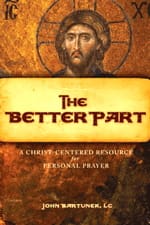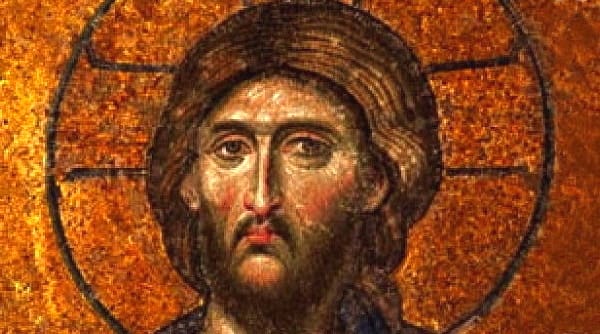“The final age of the world has already come upon us. The renovation of the world has already been irrevocably decreed and in this age is already anticipated in some real way.” – Second Vatican Council, Lumen Gentium, 48
 Mark 13:14-27: ‘When you see the disastrous abomination set up where it ought not to be (let the reader understand), then those in Judaea must escape to the mountains; if a man is on the housetop, he must not come down to go into the house to collect any of his belongings; if a man is in the fields, he must not turn back to fetch his cloak. Alas for those with child, or with babies at the breast, when those days come! Pray that this may not be in winter. For in those days there will be such distress as, until now, has not been equaled since the beginning when God created the world, nor ever will be again. And if the Lord had not shortened that time, no one would have survived; but he did shorten the time, for the sake of the elect whom he chose. And if anyone says to you then, Look, here is the Christ or, Look, he is there, do not believe it; for false Christs and false prophets will arise and produce signs and portents to deceive the elect, if that were possible. You, therefore, must be on your guard. I have forewarned you of everything. But in those days, after that time of distress, the sun will be darkened, the moon will lose its brightness, the stars will come falling from heaven and the powers in the heavens will be shaken. And then they will see the Son of Man coming in the clouds with great power and glory; then too he will send the angels to gather his chosen from the four winds, from the ends of the world to the ends of heaven.’
Mark 13:14-27: ‘When you see the disastrous abomination set up where it ought not to be (let the reader understand), then those in Judaea must escape to the mountains; if a man is on the housetop, he must not come down to go into the house to collect any of his belongings; if a man is in the fields, he must not turn back to fetch his cloak. Alas for those with child, or with babies at the breast, when those days come! Pray that this may not be in winter. For in those days there will be such distress as, until now, has not been equaled since the beginning when God created the world, nor ever will be again. And if the Lord had not shortened that time, no one would have survived; but he did shorten the time, for the sake of the elect whom he chose. And if anyone says to you then, Look, here is the Christ or, Look, he is there, do not believe it; for false Christs and false prophets will arise and produce signs and portents to deceive the elect, if that were possible. You, therefore, must be on your guard. I have forewarned you of everything. But in those days, after that time of distress, the sun will be darkened, the moon will lose its brightness, the stars will come falling from heaven and the powers in the heavens will be shaken. And then they will see the Son of Man coming in the clouds with great power and glory; then too he will send the angels to gather his chosen from the four winds, from the ends of the world to the ends of heaven.’
Christ the Lord This discourse takes place as St. Mark’s Gospel is reaching its climax when Jesus and his apostles are relaxing on the Mount of Olives overlooking Jerusalem after a busy day teaching and contending with the rabbis in the Temple. Jesus knows that the culmination of his earthly mission is drawing near (echoed in the liturgy by the approaching end of another liturgical year – the passage is read in the Church at the end of Ordinary Time), and he takes advantage of a comment by his disciples about the glory of the Jewish temple to point out to them the passing nature of all worldly glories.
We can picture the Lord explaining these coming events, almost seeing them unfold in his mind’s eye, as the disciples stare at him, hardly daring to believe what he is saying, wondering exactly what he means. He speaks of these future events with a sureness and clarity that we have come to expect, but which must have been alarming – if not frightening – for his disciples. If we read these words as if we were hearing them for the first time, we can better understand the sense of urgency that the first Christians had about spreading the gospel. The Lord is speaking about the end as if it’s right around the corner, which it is – if not the end of history, at least the end of each of our lives – and he wants his followers to live with that in mind. This is no casual observation; our Lord tells us, “I have forewarned you of everything…” As his faithful followers we know all we need to know about the future – more than enough to keep us focused, balanced, and purposeful in the present.
Christ the Teacher In this conversation with his apostles Jesus is speaking primarily and literally of the coming destruction of Jerusalem, which occurred before the passing of the disciples’ generation in 70 AD. He warns them that the days when the Roman army lays siege to Jerusalem will be full of horrific suffering. It came to pass just as he said. More than a million Jews died in that final rebellion and siege, and only about 30,000 survived, according to the contemporary historian Josephus. But Jesus affirms that the Lord will be in control even of that tragedy – he will “shorten the time” for the inscrutable purposes of his wisdom.
But Jesus goes on to describe “those days” using another kind of language. He speaks of the sun being darkened, the moon going out, stars falling and heaven shaken, the Son of Man coming on clouds, angels gathering the chosen from the ends of the earth… This is  the language used by the prophets (and other spiritual writers of the time) to refer to the end of the Old Covenant and the establishment of the promised Messianic Kingdom. In the first part of the discourse Jesus was preparing his disciples for the destruction of Jerusalem and the Temple, and now he is explaining what that coming destruction means. It will be the visible sign that the New Covenant has fulfilled and supplanted the Old Covenant. The apostles, on whom Jesus builds his Church, his New Covenant community, are to be messengers of the end-times, because the New Covenant issues in the last period of human history, which will draw to its close when Jesus comes again to administer the final judgment, banish evil forever, and recreate the heavens and the earth.
the language used by the prophets (and other spiritual writers of the time) to refer to the end of the Old Covenant and the establishment of the promised Messianic Kingdom. In the first part of the discourse Jesus was preparing his disciples for the destruction of Jerusalem and the Temple, and now he is explaining what that coming destruction means. It will be the visible sign that the New Covenant has fulfilled and supplanted the Old Covenant. The apostles, on whom Jesus builds his Church, his New Covenant community, are to be messengers of the end-times, because the New Covenant issues in the last period of human history, which will draw to its close when Jesus comes again to administer the final judgment, banish evil forever, and recreate the heavens and the earth.
In this context, all of Jesus’ predictions of disasters and wars and suffering apply directly to the coming destruction of Jerusalem, as the visible inauguration of the end-times, the age of the Church. But they also apply as a kind of pattern for what will continue to happen throughout the age of the Church until the culmination of history. Thus, the lesson he wants the apostles to learn – that they should live with the clear awareness that this life is a time for mission, not for idleness or indulgence – applies equally to all Christians throughout history. They did not know the exact “day or hour” that Jerusalem would be destroyed, but they knew that before it happened the Church would spread throughout the world, winning converts from the four corners of the globe, and they knew they would suffer in myriad ways. Just so, we do not know the exact day or hour that our lives will end, nor do we know when Jesus will wrap up human history as a whole, but do we know that in the meantime the Kingdom will continue to grow and suffer growing pains, in us and throughout the world. Jesus wants us to live with this in mind.
Christ the Friend Some critics claim that passages like this were later additions to the Gospels, since they depict Christ as harsh and demanding, not gentle and forgiving. But if Christ knew that he would be coming again “to judge the living and the dead,” it would have been cruel not to tell us about it. Because he wants to be able to reward us at the end of our earthly pilgrimage, he constantly reminds us to keep first things first while we are still on our way. Sometimes true friends need to be demanding – and Christ is nothing if not a true friend.
His coming in this life already gives us a foretaste of what it will be like at the end. Every time he leads us further along the path of discipleship, it entails some kind of destruction, some kind of loss. A habit of sin, a sinful tendency, an inordinate attachment – to follow Christ more closely, to know and love him better, requires become a new creation, over and over again, and that means leaving the old behind, letting it be destroyed by the flow of God’s renewing grace.
Christ in My Life I am envious of the apostles, Lord. They had you at their side; they could hear your voice and see your face as you taught them. I want to know you better. I know you are always speaking to my heart and guiding me, but I am so hard of hearing! Lord Jesus, teach me to do your will, teach me to follow your path, teach me to hear your voice always and everywhere…
This world is so beautiful and full of so many good things. Thank you for this life, this earth, and the many blessings you never fail to shower upon me. And yet, you are leading me to something much more beautiful. Why do I think of it so rarely? You are looking forward to welcoming me into your heavenly Kingdom. Thy Kingdom come…
I believe in you. I believe that you are the Lord of life and history, that you are the way, the truth, and the life. I believe that you will come again to judge the living and the dead. I believe that you love me and have revealed the path of salvation to me through the Church. I believe in you, Lord; now help me to put my faith into action…
+
Editor’s Note: The reflection on the rest of this Sunday’s Gospel is contained in Fr. John’s next meditation on Mark 13:28-37, found on site today. Click here to continue reading.
PS: This is just one of 303 units of Fr. John’s fantastic book The Better Part. To learn more about The Better Part or to purchase in print, Kindle or iPhone editions, click here. Also, please help us get these resources to people who do not have the funds or ability to acquire them by clicking here.
+
Art for this post on Mark 13:14-27: Cover of The Better Part used with permission. Bolide (Fireball [of a Meteor Event]), Thomas Grau derivative work of Basilicofresco, 28 April 2010, PD-self, PD-Worldwide, Wikimedia Commons.


